 The Grenade, by Australian playwright Tony McNamara, has catapulted up the internationally-renowned chart of Fiona’s Favourite MTC plays to be equal number one with Grace. Grace made me weep. The Grenade made me have an embarrassing coughing fit because I was laughing so hard. So in the lesser-known but equally lauded chart of Fiona’s Favourite MTC Comedies, this is an absolute number one.
The Grenade, by Australian playwright Tony McNamara, has catapulted up the internationally-renowned chart of Fiona’s Favourite MTC plays to be equal number one with Grace. Grace made me weep. The Grenade made me have an embarrassing coughing fit because I was laughing so hard. So in the lesser-known but equally lauded chart of Fiona’s Favourite MTC Comedies, this is an absolute number one.
Political advisor Busby McTavish comes home to his beloved family one night and finds a live grenade on his lounge room floor. Who would do something like this? When you’re in politics, it could be anyone—or perhaps it’s an enemy of his teenage daughter Lola, because all teenagers have enemies. Or is it someone closer to home? Could something like this twist your trust in your family? Busby takes charge, turns his house into a fortress, and watches his family’s every move. And somehow, it’s hilarious.
After all these plays it still takes me a while to warm to seeing people physically in front of me acting and to let myself get involved in the world of theatre after being so used to cinema, where, because it’s onscreen with elaborate sets, you can abandon yourself to that “reality” much easier. But happily this didn’t take long, distracting me with jokes straight away—and the flawless set helped. A rotating stage held four different scenes, some malleable, all perfect, though most of the play was set in the McTavish’s plush lounge room and kitchen. The faultless lighting turned the rooms into night and days so realistic I was almost surprised to find it dark outside when I left. The sound seemed a bit low at the start (or I have been listening to my iPod with the sound up too loud again, a probable alternative), but then became pitch-perfect, with fitting dramatic musical interludes as the set revolved to the next scene. So, top-notch production, meaning that at the end when the actors gesture to the crew of the play I was clapping just as hard.
Garry McDonald surprised me by cutting quite a dashing figure, trim in his nice suits and still looking the same (from the upper level of the Playhouse, anyway) as he did twenty years ago. Busby’s wife, ex-nun Sally, is played with beauty and naive humour along with the fraught panic of a new mother by Belinda Bromilow; Neighbours starlet Eloise Mignon shines as the high-pitched Mensa-genius daughter, openly attempting rebellion. Wheat, the oddity love interest of Lola played by Gig Clarke, gives a persuasive and esoteric performance; Jolyon James channels Fabio as open-minded erotic novelist Randy Savage, commissioned along with romance novelist Sally to write a new genre of novel (“erotomance”, or “romagasm”), and there to upstage Busby in every possible way and send women into a frenzy with just a touch. Genevieve Picot is Busby’s ex-wife Kerry, a woman unafraid of admitting her faults (Busby shouts at her, “You shagged two of my co-workers!” and she says, “You said to mingle!” to which he replies, “I didn’t mean juices!”). Rounding out the cast is Mitchell Butel, as Whitman, McTavish’s energetic and amoral co-worker.
Busby is occasionally a bit of a prick, and has a job that celebrates such a character trait, but ultimately he is redeemed by the adoration he has for his family. Characters like Wheat, who arrives for his first meeting with Lola’s father wearing a balaclava, and Randy, whose heroic acts toe the line of the unlikely, are so bizarre and unrealistic that they veer right back into strangely human. They’re an idiosyncratic bunch, frankly, especially six-month-old Michael, Sally and Busby’s son, whose astonishing exploits have his family convinced that he is a demon.
Look, it’s not as perfect as I’m making it out to be. If there’s one thing I never find funny, it’s men whining about how women never have enough sex with them, a gag that is as painfully overdone in this play as it is in reality. The actually fairly horrific subplot about Busby’s current work situation is handled far too lightly. But on the whole, it was hilarious, and I would completely recommend it. The fact that it’s an Australian script doesn’t hurt either; you can get all choked up with patriotic pride in our abilities as a nation, too. Nowhere else could a joke about Julia Gillard’s tongue ring make any sense.
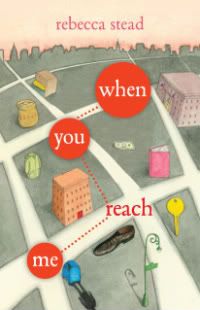 When I first started this blog, I assumed I’d be writing only about books. After all, books are what I know and sell. Turns out what I apparently most like to talk about, however, are movies, but now that I’ve given myself a stern talking-to regarding cinema prices I will have to limit them. Or, so I tell myself until next Friday when I start to get a hankering for a Frozen Coke and a sweaty ticket box queue. I have read books, but they’ve mostly been okay, not really good enough to get into a flap about or terrible enough for me to enjoy getting my teeth into. Until now, when—as always—it’s a children’s book that reminds me just how excellent those papery things what have words in them can be.
When I first started this blog, I assumed I’d be writing only about books. After all, books are what I know and sell. Turns out what I apparently most like to talk about, however, are movies, but now that I’ve given myself a stern talking-to regarding cinema prices I will have to limit them. Or, so I tell myself until next Friday when I start to get a hankering for a Frozen Coke and a sweaty ticket box queue. I have read books, but they’ve mostly been okay, not really good enough to get into a flap about or terrible enough for me to enjoy getting my teeth into. Until now, when—as always—it’s a children’s book that reminds me just how excellent those papery things what have words in them can be.
I sat down to read the start of Rebecca Stead’s novel over lunch last Monday (rye bread toast with avocado, tomato, salt and pepper, because I know you’re interested) and put it down briefly when I decided I should do some real work, then decided instead that I should just maybe read a little bit more of the book and snack on some bagel crisps. Well, the crisps were disgusting (damn you Burns & Ricker) but the book made me forget them completely, and I finished it in one fascinated sitting. When You Reach Me tells the story of twelve-year-old Miranda, in sixth grade at a New York City school in 1978. She and her mother live together in an apartment above her oldest friend Sal and his mother Louisa; Miranda’s mother has a great boyfriend called Richard; everything is going fine. Then one day, as they’re walking home from school together, Sal is confronted by another kid and punched squarely in the stomach and the face. Miranda helps him home and is worried, but the incident changes their friendship and Sal will not talk to Miranda. While Miranda tries to figure out why this is happening, and gains some new pals in the ethereal Annemarie and smartass Colin, another, more unexpected storyline is building up—one involving notes left for Miranda with predictions that can only mean one thing. And that is time travel.
I first heard of this book from a co-worker who was explaining it to myself and a customer. It sounded great and she clearly enjoyed reading it, but the time travel aspect threw me off a little. I spent all of high school paying attention in English and reserving all of my staring-moodily-out-of-the-window for science classes, so while I know they didn’t teach time travel in Science (at least not at my high school) I always feel a little out of my depth reading science fiction, even that aimed at people I am old enough to parent. But When You Reach Me handled all discussions of time travel with such a perfect touch that it explained the necessary concepts clearly without ever sounding patronising, bar snippy character Julia who tries, along with wise Marcus, to explain it to a baffled Miranda, but eventually stomps off saying, “I’m glad someone here has a brain.” The time travel is both an important part of the story but it never threatens to overwhelm the reality of being a kid in a world where relationships are difficult, and that is why it is so great. Mira loves her mother but is embarrassed by their home in comparison to her friends’ apartments; she begins to fall in love; she fights with her new pals. She also learns a lot and even when she is angry or in the wrong, she is still a perfectly human heroine who has a good heart. While I haven’t been twelve for a while, reading it took me right back to what conversations and relationships were like when I was the same age. Life could be funny and upsetting and comforting and awful and the most exciting thing in the world. When You Reach Me is a beautiful, funny, read that doesn’t sugarcoat reality, making it more than accessible for older or adult readers while still being wonderful for the upper-primary age group it depicts.
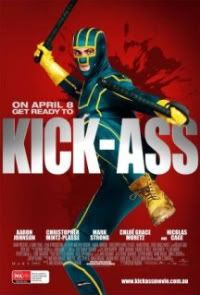 First of all, I have to tell you that before Kick-Ass was released at the cinema, I had bright purple hair and a china doll haircut. I can only assume that Mindy Macready, AKA Hit Girl, was drawn squarely based on me. Alas, that’s where the similarities end. I’m twenty-seven, not eleven, and if I was in a fight I would probably just flail around crying, while Hit Girl would calmly and with a couple of sweary zingers dispatch of everyone in sight. Quite frankly, she is the most awesome thing in cinema. I am just the most awesome thing currently on this couch. (Truth as cat has vacated to the carpet and I only have to vie with two cheap cushions.)
First of all, I have to tell you that before Kick-Ass was released at the cinema, I had bright purple hair and a china doll haircut. I can only assume that Mindy Macready, AKA Hit Girl, was drawn squarely based on me. Alas, that’s where the similarities end. I’m twenty-seven, not eleven, and if I was in a fight I would probably just flail around crying, while Hit Girl would calmly and with a couple of sweary zingers dispatch of everyone in sight. Quite frankly, she is the most awesome thing in cinema. I am just the most awesome thing currently on this couch. (Truth as cat has vacated to the carpet and I only have to vie with two cheap cushions.)
Spider-man should just give up and get walking pout Tobey Maguire to pulp all copies of the DVDs. The Dark Knight should sell all its copies at a dollar each and use the funds to pay for the operation that Christian Bale’s voice box clearly needs. Iron Man can stick around (sequel pending) because it had what Kick-Ass did: great entertainment value. (I’m predicting a good April in the superhero genre.) Kick-Ass was the goriest, most curse-filled superhero movie I’ve seen, and all the better for it—it was different, but still satisfyingly familiar.
Everyteenager Dave hangs out with his two friends in comic book stores and pines after fellow classmate Katie. He wonders aloud why more people don’t become caped crusaders, helping their fellow man when they can—why everyone just turns a blind eye. His friends point out that it’s a dangerous idea, but Dave won’t let go, and after buying some gloves and a scuba-diving outfit online he tries his hand at becoming someone worth admiring.
Unlike She’s Out of My League, this guy’s friends are smart cookies. It is dangerous. An attempt to stop car thieves turns into a bloody and unexpected failure that is compounded when he stumbles into the path of an oncoming car. The end result is the closest to a superpower that any human could have, and with clearly no lessons learned, Dave—now Kick-Ass—takes it upon himself to stick up for the people, this time with a higher pain tolerance. But he’s not the only superhero in town.
Big Daddy is an ex-policeman, bitter and with the priorities of an eleven-year-old. Luckily for him, he has an eleven-year-old, his daughter Mindy (aka Hit Girl) whom he has educated in the ways of superheroicness. Her “homework” consists of comics and movies and the rest of their time is spent in training as they pick their way through drug dealers and criminals to get to the supervillain—well, an everyday villain—Frank D’Amico. D’Amico misinterprets Big Daddy and Hit Girl’s shenanigans as Kick-Ass’ doings, and decides he must be taken down. Enter new superhero/villain/D’Amico son Red Mist, desperate to demonstrate his evil worth while also being generally quite everyday himself.
The casting is fantastic; Aaron Johnson plays Dave, after a stint as John Lennon in Nowhere Boy. His blue eyes will make you come over all weak at the knees when he is otherwise ensconced in his superhero costume, and he plays Dave pitch-perfect as someone who, despite the star power around him, carries the movie by being utterly likable. Nicholas Cage is Big Daddy, and channels Adam West as a loving father who doesn’t see a problem with his daughter laughing, “I’m just fuckin’ with ya, daddy,” in a diner. Hit Girl herself is Chloe Moretz, whip-smart in (500) Days of Summer, and right now cooler than anyone else in film. Frank D’Amico is played by Mark Strong, who also did a fabulous evil turn in Sherlock Holmes, and a kind of lesser, acceptable evil in the underrated gangster flick Rocknrolla. Christopher Mintz-Plasse is Red Mist, doing well with what is surely one of his final roles playing a teenager now that he’s starting to look like a grown-up.
Bar a not entirely perfect green-screen ending, the stunts and special effects are great, the entire film is a whole stack of ridiculous fun, while also retaining a sense of the ordinary. Dave’s relationship with Katie, who believes he is gay and takes him under her wing, has the exact right awkward chemistry that teenage relationships do. Dave’s pals are normal but hilarious and their friendship strikes the right chord. The major players in the film are all clearly a tad batshit insane to be doing what they do, but all are human beings, from Hit Girl making her father a hot chocolate and the way he clearly worships his daughter, to D’Amico taking his son to the movies (and, in a quietly hilarious scene, discussing what snacks to get in the car outside his factory, pausing only for the screams of someone inside being tortured.) The splatty and kaboomish ending is the kind that could bring on a round of applause from cinemagoers. Both ordinary and extraordinary, Kick-Ass is a great night out, though not for the faint-hearted or anyone who will call child services on account of Chloe Moretz saying the c-word. Which, I discovered, is alarming no matter how prepared you are for it.
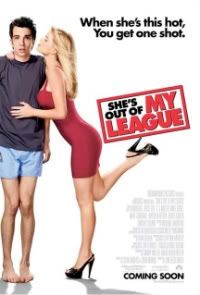 I think I’m doing a commendable effort at linking my reviews of films currently showing at the theatre. The last two have shared the word “dragon” in the title (but, happily, no other similarities), and this movie connects to How to Train Your Dragon by sharing two actors: Jay Baruchel and TJ Mills. Last time I physically saw Baruchel in a movie, he was the shifty heartthrob in Nick and Norah’s Infinite Playlist. Now, apparently he’s the gangly and awkward one. In She’s Out of My League, Baruchel is Kirk, a slightly useless guy in his late twenties who works at the airport and has a group of equally useless friends who all seem to do nothing at work but sit in the transit lounge and talk about girls. Mills is one of those friends, a bit of a bastard, very sweary, vaguely appealing in an abrasive kind of way. There’s also the handsome friend, who does nothing but stand and look handsome, and the romantic friend, who likens everything to a Disney movie. In a way, they appear to be mimicking the friendship group from (500) Days of Summer, though bereft of a smartass little sister played by Chloe Moretz or any other friend who actually knows what they’re talking about.
I think I’m doing a commendable effort at linking my reviews of films currently showing at the theatre. The last two have shared the word “dragon” in the title (but, happily, no other similarities), and this movie connects to How to Train Your Dragon by sharing two actors: Jay Baruchel and TJ Mills. Last time I physically saw Baruchel in a movie, he was the shifty heartthrob in Nick and Norah’s Infinite Playlist. Now, apparently he’s the gangly and awkward one. In She’s Out of My League, Baruchel is Kirk, a slightly useless guy in his late twenties who works at the airport and has a group of equally useless friends who all seem to do nothing at work but sit in the transit lounge and talk about girls. Mills is one of those friends, a bit of a bastard, very sweary, vaguely appealing in an abrasive kind of way. There’s also the handsome friend, who does nothing but stand and look handsome, and the romantic friend, who likens everything to a Disney movie. In a way, they appear to be mimicking the friendship group from (500) Days of Summer, though bereft of a smartass little sister played by Chloe Moretz or any other friend who actually knows what they’re talking about.
Kirk is trying pathetically to win back the heart of Marnie, the fairly horrible ex-girlfriend who—along with her new boyfriend—still hangs out with Kirk’s family and is seemingly preferred by them as well. His friends tell him to stop, but there’s no other girls on his horizon until gorgeous event planner Molly, played by the beautiful Alice Eve, accidentally leaves her phone behind at the airport. Kirk finds it, and to thank him, she takes him out to dinner. Despite the misgivings of his pals and Molly’s caustic friend Patty, their relationship flourishes. Kind of.
Where this movie falls flat is that their relationship never feels real. They do have a mild amount of chemistry and are separately pretty affable, but every conversation Kirk and Molly have is awkward, strained and painful to watch. The camera pans out on these stilted discussions, plays a happy tune and suddenly we see them laughing and joking. The prerequisite relationship montage shows them getting along fine, but the audience is not really privy to why they get along. Just like their friends, concerned about the difference in their ratings—Molly being a “hard” 10, Kirk wallowing around the five mark—you won’t be convinced their relationship will work out either. So when the inevitable scene comes where their preconceptions of the romance outweigh what they feel, it is the least surprising thing and you aren’t too concerned if they both go off and lead full happy lives without each other. But it’s a rom-com, so of course it doesn’t end there.
On the upside, a lot of scenes are hilarious—Kirk’s ball-shaving scene, which you may have seen in the trailer, is one; another is when he gives his family what-for as they sit in a plane waiting to head off on vacation. It also ventures into gross-out comedy with Kirk a little too excited just before he meets Molly’s staid parents. Much of the comedy is derived from that pained, uncomfortable Meet-The-Parentsesque humour, which is my own personal bugbear. Don’t we get enough in reality? Do we need to watch others suffer too? (Two Parents sequels say yes, but I say no.) The soundtrack to She’s Out of My League is pretty great, with tunes from the likes of The Fratellis and sex-in-tight-pants Pop Levi. Overall, the movie is no hard ten of a hot blonde made entirely of friendly, but the five of a guy with no self-esteem who listens to his friends over his own feelings.
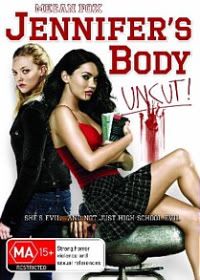 I was surprised to see this, Diablo Cody’s first movie since Juno, shooting straight to DVD. Juno was such a hipster success here with all its jive-talkin’ and rising starlets—how could Jennifer’s Body, starring Megan Fox’s body, not be a hit seen by squillions? Well, because it’s terrible.
I was surprised to see this, Diablo Cody’s first movie since Juno, shooting straight to DVD. Juno was such a hipster success here with all its jive-talkin’ and rising starlets—how could Jennifer’s Body, starring Megan Fox’s body, not be a hit seen by squillions? Well, because it’s terrible.
Juno was a movie that suffered from too much hype. It was a good piece of cinema, but could never be as brilliant as the frenzy of adoration made it out to be. I thought it was fine, but hardly flawless, and as we all know no one actually talks like anyone in that film actually did. Still, Ellen Page is pretty endearing and any movie with JK Simmons in it can’t be that bad. Or, so I thought until he turned up in Jennifer’s Body, apparently the school’s only teacher and wielding a ridiculously fake hook hand. The school I mention is the high school that Fox’s Jennifer and her bestest pal ever, Amanda Seyfried’s Anita, go to. Jennifer is a beautiful cheerleader, Anita (otherwise known as Needy) a slightly dorky, fizzy-haired companion. (You can tell she is dorky because at the start she wears glasses, which she apparently doesn’t need at the end of the film when she gets tough.) Needy has a boyfriend in the lovable Chip.
And that’s just about all the background information you get on the girls. They go out one night to a seedy bar to watch a band whose lead member is “salty”, according to Jennifer, and after the gig is abruptly cut off when the entire place goes up in flames. They escape unharmed, and Jennifer gets into the band’s van and leaves Needy behind, worrying that her friend has made a stupid move. (Arguably, agreeing to play Jennifer was Fox’s first stupid move here.) And she has, but not as expected—when Needy sees her next, Jennifer is a demon, and a bloody, vomiting, hungry one. Her favourite food of choice, alas, is young cliched males. With the town in fear of the brutal serial killer on the loose, no one but Needy understands that it is Jennifer that is the culprit, so she takes matters into her own hands.
The movie bites in just about every way. It’s not particularly funny, bar a couple of amusing scenes—like when Needy and Chip are indulging in some awkward but adorable teenage bonking, and Needy gasps in horror from a vision of Jennifer eating a fellow student. Chip pauses in concern and says, “Are you okay? Am I too big?” (Aw, teenagers.) It’s not scary either, and I can’t really interpret much social commentary from it. The student body—what little we see of it—are parodies of themselves; Goths that are willing to declare their love of the Dark Lord at a fellow Goth’s funeral with his straitlaced parents looking on, bemused; a few goofy-looking footballers the size of houses who only wear letterman jackets and aren’t too bright. It’s not gory, it’s not dramatic, it’s not involving—it’s a big roll of film that gives you nothing at the end. Sometimes, it’s just confusing, like when Needy goes to the prom in a bright pink dress with poofy sleeves that would have been divine in 1986 but now seems like an unexplained joke, and isn’t even useful for fighting in. When an injured Chip sees her in her dress and says, “You look beautiful,” she says, “Oh my god, you’re delusional!” in all seriousness. While Juno was almost entirely made up of a newfangled teenage language, Jennifer’s Body doesn’t have as much, and then, unforgivably, explains itself when it does. “Salty” means “cute”, in case that wasn’t blindingly obvious already.
I tried hard to think of something good about the movie, but all I could come up with was one thing: Fox herself. For all the movies I’ve seen her in (er, just Transformers, actually) I’ve never really seen her just stand around or walk or have a multitude of expressions. Even when she is gaunt and starved of human flesh, even when she is vomiting spiky black bile—she is an absolute knockout. Perhaps I just covet blue eyes because mine are brown, and long flowing black hair because mine won’t grow fast no matter how much I will it to, but she really is beautiful, even though in this movie she is nothing but an absolute bitch, even before she is a demon.
There’s no twist, it’s boring and pointless, and frankly whatever you imagine this movie to be like will be better than how it is, so just go on Google Images, find some pictures of Megan Fox, print them out, make them into paper dolls and create your own version. It’ll be Oscar-worthy in comparison.
Well, I have consulted with shamans, looked to the stars for guidance, flipped a hundred coins under the exact same conditions and asked John Edwards who should win. Drum roll please, because the winner of our two Capital Punishment Comedy Festival Tickets is...
 LeahJane! Congratulations, expect to be contacted with your ticketing details. Have fun! Laugh lots! Don’t forget to take a spare pair of underpants.
LeahJane! Congratulations, expect to be contacted with your ticketing details. Have fun! Laugh lots! Don’t forget to take a spare pair of underpants.
(And thanks to Sally for guiding me to random.org! Also congratulations to her too for her own personal win.)
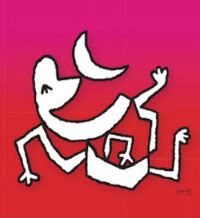 Due to some unexpected good luck and your friendly neighbourhood comedians, read, watch, listen has been offered two free tickets to see Capital Punishment at the Melbourne Comedy Festival—and they’re up for grabs for you, dear reader. If you want to get your greasy paws on these tickets, for Thursday night’s gig in Melbourne Town Hall’s Backstage Room, all you need to do is leave a comment here—and you don’t need to be a blogspot member to post a comment. All I want from you is to leave your name and a joke, no matter how terrible, and I’ll randomly pick a winner on Wednesday morning and post the winner then. And I’ll even start!
Due to some unexpected good luck and your friendly neighbourhood comedians, read, watch, listen has been offered two free tickets to see Capital Punishment at the Melbourne Comedy Festival—and they’re up for grabs for you, dear reader. If you want to get your greasy paws on these tickets, for Thursday night’s gig in Melbourne Town Hall’s Backstage Room, all you need to do is leave a comment here—and you don’t need to be a blogspot member to post a comment. All I want from you is to leave your name and a joke, no matter how terrible, and I’ll randomly pick a winner on Wednesday morning and post the winner then. And I’ll even start!
Q: What’s brown and sticky?
A: A stick.
See, you know you can do better, don’t you? Well, go on then.
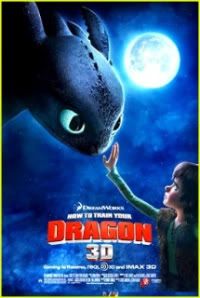 Sometimes you decide to go to the movies and you head up the stairs to the cinema and it occurs to you: this is not my finest idea. When I went to see Team America: World Police on a Saturday night in the suburbs and the crowd was about 75% drunk sixteen-year-olds, I should have gone home, made a pot of tea and quietly read a book. Instead, I spent the film witnessing fights and ducking as people threw beer bottles at the screen, interspersed with occasional giggles (no lie, that vomiting scene almost made me pee my pants.) And the same feeling of apprehension washed over me when I went to see How to Train Your Dragon at 10:20am on the first Tuesday of the school holidays and the queue was made up of seven parents and ten million eight-year-olds.
Sometimes you decide to go to the movies and you head up the stairs to the cinema and it occurs to you: this is not my finest idea. When I went to see Team America: World Police on a Saturday night in the suburbs and the crowd was about 75% drunk sixteen-year-olds, I should have gone home, made a pot of tea and quietly read a book. Instead, I spent the film witnessing fights and ducking as people threw beer bottles at the screen, interspersed with occasional giggles (no lie, that vomiting scene almost made me pee my pants.) And the same feeling of apprehension washed over me when I went to see How to Train Your Dragon at 10:20am on the first Tuesday of the school holidays and the queue was made up of seven parents and ten million eight-year-olds.
Alas, not much will stop me from going to the movies when my heart is set on a Jumbo Combo (one large Coke, one large frozen Coke, one box of popcorn probably aimed for whole families but which ends up entirely in my belly) and something to write a scathing review about later. So me, Chris and our friend Emma took our seats four rows from the front and I prepared to have popcorn pegged at my head and kids screaming MUUUUM HE’S TOUCHING MY ARMREST and NO THAT IS MY CHOCTOP YOURS IS BANANA WAIT I WANT THE BANANA ONE for the entire film. Turns out, I should not be so cynical about the youth of today. All the kidlets were impeccably behaved and the only time they were noticeable was when they were totally adorable: during the generic skit at the start which tells you to put on your 3D glasses and shows a robot puppy chasing a ball, the little girl in our row reached out to hug the puppy. (Aww, right?) And once the movie had finished and we were sitting in our chairs waiting for Fiona to watch the credits for some exciting thing at the ending (there is none), about fifty kids barrelled down to the floor in front of the cinema, spread their arms out and proceeded to run happily around being dragons with each other. (AWWW, right?)
Anyway, now that my cinematic experience has been shared fully, you’d probably like to know about the movie itself. It has to be said that I was surprised to find that the best action movie I’ve seen so far this year is this by a mile. The dragon fight scenes, especially at the end, had my heart beating faster and I was clinging to Chris’s hand with all the nervous tension I was not really expecting. I don’t think it was necessarily the 3D—though it was good—as much as just great direction. It’s heartstopping stuff.
The film, based on Cressida Cowell’s novel, tells the story of young Viking Hiccup (Jay Baruchel), a spindly thing who doesn’t fit in with the oversized other members of the island he lives on. Hiccup wants desperately to be a dragon killer like his father, played with as much of Scotland as Gerard Butler could muster. Alas, he is a bit weedy—comparatively speaking—which means he is unable to lift anything to fling or stab at a dragon, and is thus made to hang out with the blacksmith and make the weapons for the big boys and girls to use. But he’s a smart one, and he comes up with his own contraption to fight the dragons...which both fails when it brings further ruin to Hiccup’s village, but succeeds when he does, in fact, net one of the creatures.
Enter Toothless: a big adorable and now broken dragon, looking like a cat who fell out of an icanhascheezburger.com image and hit its head on a Lilo and Stitch DVD on the way down. He purrs, he flaps his lizardy frill around like kitty radar ears, and you just want to hug him and squeeze him. Hiccup sees in Toothless not an enemy, but someone else who’s just trying to survive. How can he convince his bloodthirsty tribe that the way to defeat the dragons is not with weapons but with some good old-fashioned Disney Dreamworks love?
Not helping is his crush on ponytail-flipping fighter Astrid, and Hiccup’s demoralising relationship with his father. (The line “I have no son!” is uttered, so you can tick that box in your Movie Bingo sheet.) Familial pain aside, the movie veers from serious to slapstick when called for. Hiccup’s fellow youths, a bunch of sexily-named sidekicks (examples: Snotlout, Fishlegs, Tuffnut and Ruffnut) who, along with Astrid, are completing dragon training along with him but don’t really like him, are there to mess things up and cause general hijinks.
Some of the Viking warriors don’t come home from the expeditions to find the dragons’ nest, but actual death is kept mostly off-screen. The finale, which inevitably has a moment where you think anxiously, “Will my heroes die?” as if you’re watching The Departed instead of a kid’s movie, actually does surprise with a slight twist on the happy ending that makes it seem more, er, realistic. It seemed potentially scary to me, especially in a genuinely creepy scene where the dragons’ nest is discovered by Hiccup, but the kids in the cinema with me weren’t crying, so perhaps I’m just a bigger ’fraidy-cat than your average six-year-old.
It’s a gorgeous film visually, has enough gags for everyone and the dragons will totally steal your heart. (The first thing I said when the credits rolled was “we are going to the toy store RIGHT NOW.” Though they’d already sold out of all the Toothless figurines, which means I’m also a slower runner than your average six-year-old.) I did think the movie dragged a little while Hiccup and Toothless established their relationship, but it picked up when the dragon training started and, well, never let off from there. The voice acting from the likes of America Ferrera, Jonah Hill, Christopher Mintz-Plasse and my secret boyfriend David Tennant is all fine, despite the fact that as in the awesomely terrible 300, everyone just used their normal accents, meaning Vikings were apparently just Scottish or American. (They had boats, maybe it’s true.) But despite that, the movie’s a whole lot of fun, the 3D never overdone and occasionally beautiful, and if you don’t also want to go out and buy a Toothless figurine at the end of it, then we clearly aren’t on the same page.
 Every year Melbourne hosts its International Comedy Festival. Every year we declare we are going to go, and every year it is only when one of our friends buys tickets for us and tells us to meet them in the city at six o’clock that we actually participate. And so it is again this year, when my friends Sarah and Brett, down from Canberra for Easter, declared we were going to see Capital Punishment at the Town Hall on Saturday night. And like every year, I make refreshed vows that an hour’s worth of pants-wetting giggles are worth doing more than once and I should stop being lazy.
Every year Melbourne hosts its International Comedy Festival. Every year we declare we are going to go, and every year it is only when one of our friends buys tickets for us and tells us to meet them in the city at six o’clock that we actually participate. And so it is again this year, when my friends Sarah and Brett, down from Canberra for Easter, declared we were going to see Capital Punishment at the Town Hall on Saturday night. And like every year, I make refreshed vows that an hour’s worth of pants-wetting giggles are worth doing more than once and I should stop being lazy.
Because you, dear reader, are my friend, I will only be honest with you here. Capital Punishment is a comedy act from Canberra, where my friends are from, and they are pals with a member of the act. This doesn’t mean I’m biased, though; my friends don’t read this blog and while I got to shake hands with said member, if they ran into me again in the street and I said hello they would probably think to themselves, “Unfamiliar stranger, possible stalker, run away,” whilst speeding up their walking pace and waving politely and awkwardly.
Capital Punishment is one hour and five acts long; basically, it’s a five course meal where every dish tastes divine but doesn’t fill you up too much for the next one. It opened with Herbie and the Coleslaws, aka Hamish and Lizzie, a guitar duo who sing such tunes as “Post Orgasm Blues”—where the female part sings her “No Orgasm Blues”—and spin tales of Paris Hilton’s dog and suburban egos with their really quite excellent guitars. They don’t hold back, and their tagline is that they “put the Pee in Politically Incorrect”, but when they ask you to sing along, you really can’t resist, because it’s great fun. Following them was Dan Connell, all height and hilarity, riffing on virginity auctions (his current going price on eBay being $2.85) and suggesting a bit of penis puppetry you’ll be unable to resist attempting back at home. Next up, Dayne Rathbone, resplendent in a tucked-in shirt, wire-framed glasses and the most awkward expressions ever seen in a comedy festival, delivering his entire act with a straight face. Chris was laughing so hard he couldn’t actually physically laugh but just kind of vibrated beside me with tears down his cheeks. Rathbone read aloud a story in unerring monotone that seemed like an eight-year-old’s creative writing paper and even handed out accompanying illustrations (“This is if you crossed a shark with a cyborg and a penis”) then followed that with a short yet Pulitzer-worthy play starring a poor member of the audience who could barely stop laughing enough to read her lines. Emo Parsonson was onstage next, bouncy and unfazed by perceived silences (“This is why I got into comedy. The peace and quiet!”), then explaining his emotional baggage to the poor woman at Canberra airport in a rant that veered close to cliché and then ended with everyone almost falling off their seats. Last was another musical duo with the added thrill of being identical twins: The Stevenson Experience, Benjamin and James, singing love songs to the couple in the third row and bouncing off each other, Benjamin playing piano and singing lines of tenderness, James on guitar singing the backup vocals with the lines mixed up and the audience in tears. Also: You’re Beautiful by James Blunt, sung in Indian, German and Russian. Then the hour’s over and your stomach hurts from laughing, but you feel refreshed and happy.
Frankly, go see it. I’m giggling just remembering it. And afterwards, head to the Hoddle Room, a post-act bar which will probably be full of comedians and Australian celebrities having a beer on the balcony. I was only there for about three minutes and saw Dave Hughes, Stephen Curry, and some other stars—but I won’t say who. You know I hate to give you spoilers.
 The Grenade, by Australian playwright Tony McNamara, has catapulted up the internationally-renowned chart of Fiona’s Favourite MTC plays to be equal number one with Grace. Grace made me weep. The Grenade made me have an embarrassing coughing fit because I was laughing so hard. So in the lesser-known but equally lauded chart of Fiona’s Favourite MTC Comedies, this is an absolute number one.
The Grenade, by Australian playwright Tony McNamara, has catapulted up the internationally-renowned chart of Fiona’s Favourite MTC plays to be equal number one with Grace. Grace made me weep. The Grenade made me have an embarrassing coughing fit because I was laughing so hard. So in the lesser-known but equally lauded chart of Fiona’s Favourite MTC Comedies, this is an absolute number one.








